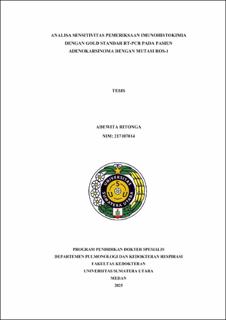Analisa Sensitivitas Pemeriksaan Imunohistokimia dengan Gold Standar RT-PCR pada Pasien Adenokarsinoma dengan Mutasi ROS-1
Sensitivity Analysis of Immunohistochemical Examination for ROS1 Mutation Compared to RT-PCR in Patients with Lung Adenocarcinoma

Date
2025Author
Ritonga, Adewita
Advisor(s)
Soeroso, Noni Novisari
Tarigan, Setia Putra
Metadata
Show full item recordAbstract
Background:
ROS1 gene mutation is one of the actionable targets in non-small cell lung
carcinoma (NSCLC), particularly the adenocarcinoma subtype. Early detection of
this mutation is crucial for determining appropriate therapy. While RT-PCR
remains the gold standard for ROS1 detection, immunohistochemistry (IHC) is
often used as a screening method due to its accessibility and rapid processing time.
This study aimed to evaluate the sensitivity and specificity of IHC compared to RT-
PCR in detecting ROS1 mutations.
Methods:
This was a diagnostic cross-sectional study conducted at RSUP H. Adam Malik and
RSU Santa Elisabeth Medan between December 2022 and December 2023. A total
of 90 patients with NSCLC adenocarcinoma who met the inclusion and exclusion
criteria were enrolled. Collected data included clinical characteristics and results of
ROS1 testing using RT-PCR and IHC. The validity of IHC was assessed by
calculating sensitivity, specificity, positive predictive value (PPV), negative
predictive value (NPV), and diagnostic accuracy, using RT-PCR as the reference
method.
Results:
Among the 90 patients, 8 (8.9%) were ROS1-positive by RT-PCR and 7 (7.8%)
were ROS1-positive by IHC. The sensitivity of IHC compared to RT-PCR was
42.9%, specificity was 94%, PPV was 37.5%, and NPV was 95.1%. The overall
diagnostic accuracy of IHC was 90%. Most patients were male (66.7%), with a
mean age of 56.46 years, and the majority were former smokers (67.8%).
Conclusion:
Immunohistochemistry shows high specificity and negative predictive value,
making it a reasonably effective screening tool for ROS1 detection. However, its
low sensitivity and positive predictive value indicate that IHC should not be used
as a standalone diagnostic method for determining ROS1 status.
Collections
- Master Theses [206]
